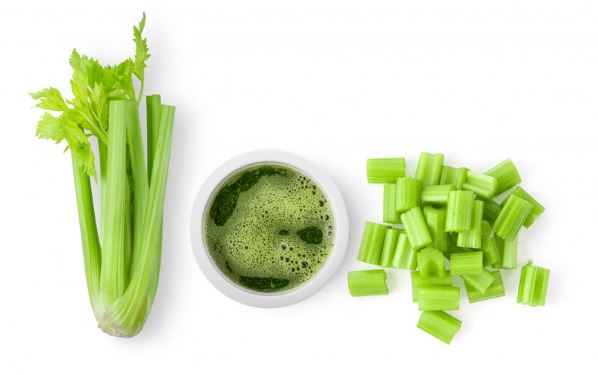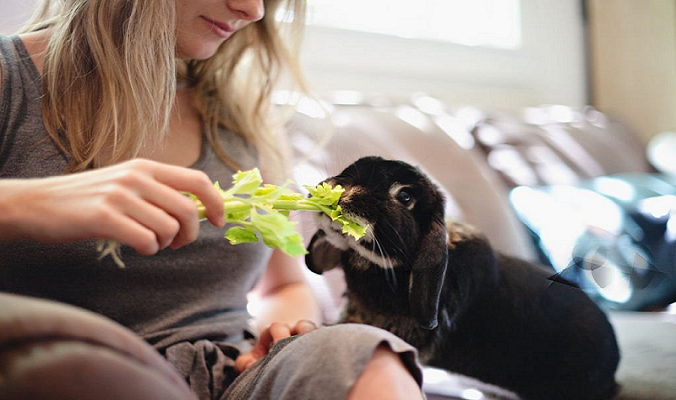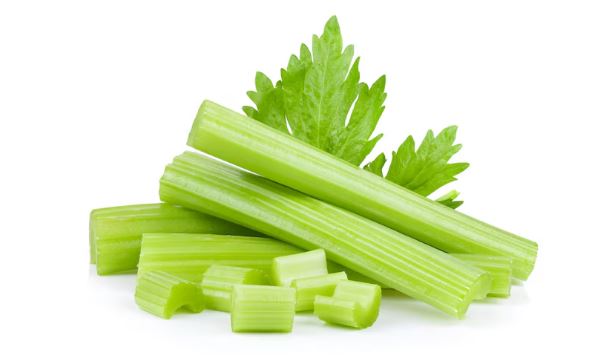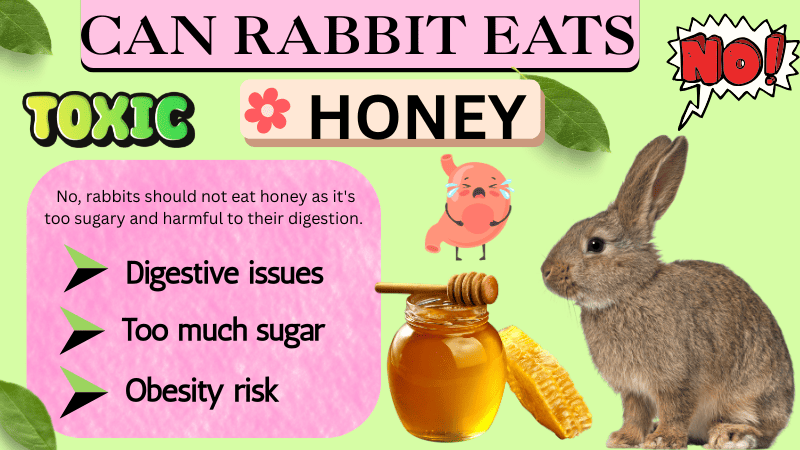Most of pet bunnies love to eat vegetable snacks; and when human being is eating foods, then easy to give a piece of them. But, there are some such foods are available that are totally safe for humans, but can be harmful to your pet rabbits. One common food is coming in your mind that is celery; then often in question: Can rabbits eat celery safely or not?
Do your pet rabbits like to munch on celery, and you’re confused if it’s good for them? You’re not just alone in the world. Most of rabbit owners have more questions about what foods are safe for their furry friends.
Don’t take headache! Through this unique article, we will explore the all benefits, dosage, and side effects of feeding celery to your beloved bunnies. Besides of this, you will also get essential feeding tips for celery to rabbits safely.
Do Rabbits like to Eat Celery? Is it Safe?
Rabbits can indeed eat celery, and many take enjoying its crunchy texture and fresh taste. Celery can be considered as safe and nutritious treat for your beloved rabbits when fed in moderation.
It has less amount calories and contains essential nutrients such as vitamins A, C, and K. You should introduce celery gradually into a rabbit’s diet to keep away digestive upset.
Rabbits equip with sensitive digestive systems, so sudden changes in their diet can pose to gastrointestinal problems. The fibrous strings present in celery stalks that can also pose a risk if they get caught in the rabbit’s teeth or throat.

So, you should cut the celery into small, manageable pieces to avoid choking and ensure easier digest. Although, bunnies also particularly enjoy in celery leaves and can be included more freely in their diet, but in moderation.
Keeping mind, don’t replace celery in the primary components of a rabbit’s diet. It should consist mainly of hay, fresh water, and a variety of leafy greens. You can allow celery as an occasional.
Health Benefits of Eating Celery to Bunnies
Celery is a beneficial to rabbit’s health when included in their diet, but as an occasional treat. Here are some of health benefits to your bunnies:
Also Read: Can Rabbits Eat Blueberries? Nutritional Benefits & Risks
Rich in Nutrients
Celery has essential vitamins and minerals that help to contribute for your rabbit’s overall health. It consist some essential vitamins A, C, and K that support many bodily functions.
Vitamin A is helpful keep maintaining the healthy vision and immune function.
The vitamin C works as an antioxidant that supporting in collagen synthesis.
Vitamin K also contributes in blood clotting and bone well-health.
Hydration
Celery contains the rich water content that can help keep rabbits hydrated, especially in the summer. Hydration is most important to keep maintaining the healthy kidney function and avoiding the urinary tract problems.
Digestive Health
The dietary fiber in celery supports in digestion and helps to prevent gastrointestinal stasis. Fiber contributes for healthy gut motility and helps to food passes smoothly through the digestive system.
Low in Calories
Celery is low in calories that making it an ideal treat for rabbits without getting any obesity risk. Should be healthy weight of rabbits, because it prevents various health issues like as arthritis and cardiovascular.
Dental Health
The crunchy texture of celery supports in keeping a rabbit’s teeth trimmed and healthy. Rabbits’ teeth grow continuously, and chewing on fibrous vegetables like celery can help wear down their teeth naturally. It also helps to keep away several dental problems like as overgrowth and malocclusion.
Antioxidant Properties
Celery is packed with antioxidants like as flavonoids and vitamin C. They are essential to make ideal the harmful free radicals in the rabbit’s body. These antioxidants support to boost-up the immune system and may also get decrease the risk of chronic diseases.
Natural Diuretic
Celery also works as a natural diuretic. It can support to urine production and helping to flush out toxins from the rabbit’s body. This supports to maintain kidney well-health and avoiding the urinary tract infections.
Nutritional Value of Celery for Bunnies
Here, we will spread light on the nutritional value of celery for bunnies, as following them:
Also Read: Can Rabbits Eat Tomatoes? Risks and Benefits
| Nutrient | Amount Per 100g | Benefit to Rabbits |
|---|---|---|
| Calories | 16 kcal | Low in calories, suitable as a treat |
| Water | 95.4 g | Aids in hydration |
| Carbohydrates | 3 g | Provides energy, but should be given in moderation |
| Dietary Fiber | 1.6 g | Supports digestive health |
| Sugars | 1.4 g | Low sugar content, reduces risk of obesity |
| Protein | 0.7 g | Minor source of protein |
| Fat | 0.2 g | Very low fat, good for maintaining healthy weight |
| Vitamin A | 22 µg | Supports vision and immune function |
| Vitamin C | 3.1 mg | Acts as an antioxidant, supports overall health |
| Vitamin K | 29.3 µg | Essential for blood clotting and bone health |
| Folate (B9) | 36 µg | Important for cell division and growth |
| Calcium | 40 mg | Necessary for bone, teeth health, and prevent stones |
| Potassium | 260 mg | Supports heart and muscle function |
| Sodium | 80 mg | Helps in fluid balance, but should be limited |
| Magnesium | 11 mg | Vital for many biological functions |
Bad Effect of Celery to Feed Your Rabbit
While celery can offer several health benefits to rabbits, it also has potential drawbacks that should be considered when incorporating it into their diet. Here are the detailed negative effects of feeding celery to rabbits:
Digestive Issues
Celery is high in water and fiber, which, if introduced too quickly or in large amounts, can lead to digestive upset. Rabbits equip with sensitive digestive systems, and at once increase in certain kinds of fiber can cause diarrhea, gas, and bloating. It’s essential to introduce celery gradually to allow the rabbit’s digestive system to adjust.
Choking Hazard
The fibrous strings in celery stalks can pose a choking risk for rabbits. These strings can get caught in the rabbit’s teeth or throat, leading to discomfort and potential choking. Cutting celery into small, manageable pieces can help reduce this risk, but the possibility still exists.
Potential for Intestinal Blockage
If a rabbit consumes too much celery, especially the fibrous strings, there is a risk of intestinal blockage. This problem can be converted in life-threatening if you don’t treat quickly. This show many symptoms including lack of appetite, decreased fecal flush out, and lethargy.
Nutrient Imbalance
While celery provides some vitamins and minerals, it lacks the comprehensive nutrient profile that rabbits need. When your rabbits get over-reliance on celery, then it could pose to nutrient imbalances; particularly if it displaces more nutrient-dense foods like leafy greens and hay in their diet. Rabbits always need a balanced diet highly in various nutrients to establish their health.
Hydration Issues
Although the high water content in celery can help keep rabbits hydrated, too much watery food can dilute their urine excessively. Due to this, many urine issues can be arisen; and may get also bad effect on kidney function over time. So, you should balance watery vegetables with other components of the rabbit’s diet.
Oxalates and Calcium Content
Celery contains moderate levels of oxalates and calcium, which, if consumed in large quantities, can contribute to the formation of bladder stones. Rabbits are particularly prone to calcium-related urinary issues, so monitoring their intake of foods high in oxalates and calcium is crucial.
Pesticide Residue
Like many vegetables, commercially grown celery may contain pesticide residues. You should thoroughly wash celery before allowing it to rabbits to remove any harmful chemicals. Organic celery is a preferable option to minimize this risk.
Types of Celery Rabbit Can Eat
Celery comes in versatile vegetable with several distinct kinds. Each one have own unique characteristics in terms of appearance, flavor, and culinary use. Here are the some common types of celery:
Pascal Celery (Common Green Celery)
Pascal celery is the most common type found in grocery stores. It has long, thick, crunchy stalks that are light green in color with leafy tops.
Golden Celery (Yellow Celery)
Golden celery is paler in color, with a more yellowish hue. It typically grows in the shaded conditions that helps to prevent chlorophyll development, then it don’t turn into green. Its flavor is milder and less bitter as compared to green celery.
Leaf Celery (Chinese Celery or Cutting Celery)
Leaf celery has thinner stalks and a stronger, more aromatic flavor compared to Pascal celery. Its flavorful leaves are often using in soups, stews, and Asian dishes.
Celeriac (Celery Root)
Celeriac is grown for its large, bulbous root rather than its stalks. The green tops are similar to leaf celery and can be used in the same way.
Self-Blanching Celery
This celery naturally blanches itself without the need for shading or covering. The stalks are usually paler and tenderer with a mild flavor. It’s often used in salads and as a garnish.
Red Celery
Red celery is a reddish-purple hue and is less common to green varieties. Its flavor is slightly stronger and adds a unique color to dishes. Due to the presence of anthocyanins, it has red color that is antioxidants.
Can Rabbits Eat Celery Leaves?
Yes! Rabbits can also have celery leaves. Celery leaves consist rich vitamins A, C, and K, along with minerals and fiber, so it can be safe and nutritious treat for your rabbits.
Also Read: Can Rabbits Eat Grapes (Leaves & Seeds)? Complete Guide
These leaves are soft in nature and rabbits easily chew them and digest as compared to the fibrous stalks that making them a great addition to their diet. When you offer celery leaves to rabbits, then should be wash them thoroughly to eliminate any pesticides or dirt.
As with any new food, introduce celery leaves gradually to monitor for any digestive signs. So, they should be part of a varied diet that includes primarily hay, fresh water, and a mix of other leafy greens and vegetables.
Can Rabbits Eat Celery Stalks?
Yes! Bunnies can eat celery stalks, but they should be allowed in moderation and prepared as properly. Celery stalks are in crunchy nature; and offer many nutrients like vitamins A, C, and K, as well as fiber.
The fibrous strings are presented in celery stalks that can pose a choking hazard if rabbits consume in large quantities. Feed celery stalks to rabbits with carefully.
Cut them into small, manageable pieces to avoid choking. Introduce celery gradually into their diet to monitor for any signs of digestive upset. Stalks also wash the thoroughly to remove any pesticides or dirt.
Can Rabbits Eat Celery Root (Celeriac)?
Rabbits can eat celery root; it is also known as celeriac. But, it should be fed in moderation and with some precautions. Celeriac is enabled with rich nutrients, including vitamins C, K, and B6, as well as potassium and fiber.
Due to its dense texture and higher starch content, it should only be an occasional treat instead of a regular diet. Before giving celeriac to your rabbit, wash it thoroughly to remove any dirt or pesticides.
Peel off its tough outer skin. Cut the root into small, manageable pieces to make it easier for your rabbit to chew and digest.
How Much Celery Can a Rabbit Eat?
Rabbits are capable to eat celery safely, when you prepare and feed properly. The amount of celery a rabbit can eat depends on their size, age, and overall diet. Here are some guidelines:
Adult Rabbits: For adult rabbit, you can offer about 1 cup of vegetables per 4 pounds of body weight every day. You can include celery in this amount at approximately ⅛ to ¼ of the total vegetables allowed.
Young Rabbits: For young rabbits or smaller breeds like Netherland Dwarfs, about ½-inch pieces of celery is sufficient. This is smaller than the recommended size for adult rabbits.
How Do You Feed Celery to Your Rabbit? Best Guidelines
When feeding celery to your rabbit, follow these guidelines for the best practices:
Also Read: Can Rabbits Eat Bananas (Peels + Leaves)? For Bunnies Owner
Wash Thoroughly: Before serving, rinse the celery under running water to remove any dirt or pesticides. This helps ensure the celery is clean and safe for your rabbit to eat.
Cut into Small Pieces: Cut the celery into small, manageable pieces to prevent choking hazards. Allow bite-sized pieces that your rabbit can easily chew.
Introduce Gradually: Introduce celery into your rabbit’s diet gradually, starting with small amounts.
Monitor Reaction: Watch rabbit closely after feeding celery for any signs of digestive issues, such as diarrhea, gas, or bloating. If you notice any adverse reactions, reduce or discontinue celery until their system stabilizes.
Moderation is Key: Celery should only make up a small portion of your rabbit’s overall diet. Offer celery as an occasional treat rather than a daily staple to ensure a balanced diet.
Freshness: Serve always fresh celery to your rabbit. Avoid wilted or spoiled celery, because it may cause digestive issues to your rabbit.
FAQs (Frequently Asked Questions)
Can Celery Kill Rabbits, if Eat Too Much?
Celery is not toxic food to rabbits, but eating too much can pose digestive issues, such as diarrhea and bloating. In severe cases, excessive intake celery may lead to gastrointestinal stasis that can be life-threatening. So, you always feed celery in moderation.
Can Rabbits Eat Cooked Celery?
No! Rabbits should not take cooked celery. Cooking changes its texture and nutritional content, then bunnies do more difficult to digest them. Rabbits are herbivores animal, so they thrive on fresh, raw vegetables. Always allow the raw celery, and cut into small pieces.
Can Rabbits Have Celery Flowers?
Yes! Bunnies can eat celery flowers. Celery flowers can be considered as safe food to their diet. But, you keep ensure that flowers should be free from pesticides and chemicals. Introduce celery flowers gradually and in moderation, observing your rabbit for any adverse reactions.
Do Wild Rabbits Eat Celery?
Generally, wild rabbits don’t encounter celery in their natural habitats. So, it is not a common part of their diet. But, if given the opportunity, they might have it. Wild rabbits generally intake grasses, herbs, and other native vegetation that are easily available in their environment.
Can Baby Rabbits Eat Celery?
Baby rabbits should not eat celery until they are at least 12 weeks old. Their digestive systems are a very sensitive, and introducing fibrous vegetables too early can cause digestive issues. Initially, they should primarily consume their mother’s milk, transitioning gradually to hay and pellets before introducing vegetables like celery.
Can Rabbits Eat Celery Every day?
No! Rabbits should not eat celery every day. While celery is safe and nutritious in moderation, daily intakes can lead to digestive issues due to its high water and fiber content. So, you can offer celery as an occasional treat, alongside a balanced diet of hay, fresh water, and various leafy greens.
Final Words
As result of this post, you can consider to add celery to your rabbit’s diet, but in moderation. There is no any valid reason that you should avoid it! Like as other new vegetable, you can introduce it gradually so that don’t upset their stomach.
Also Read: Can Rabbits Eat Peas? {Yes and No} Complete Guide
If this article is fruitful for you, then please share it along with your friends, family members, pet lovers or relatives over social media platforms like as Facebook, Instagram, Linked In, Twitter, and more.
Do you have any experience, tips, tricks, or query regarding on this? You can drop a comment!
Have a Nice Day!!







